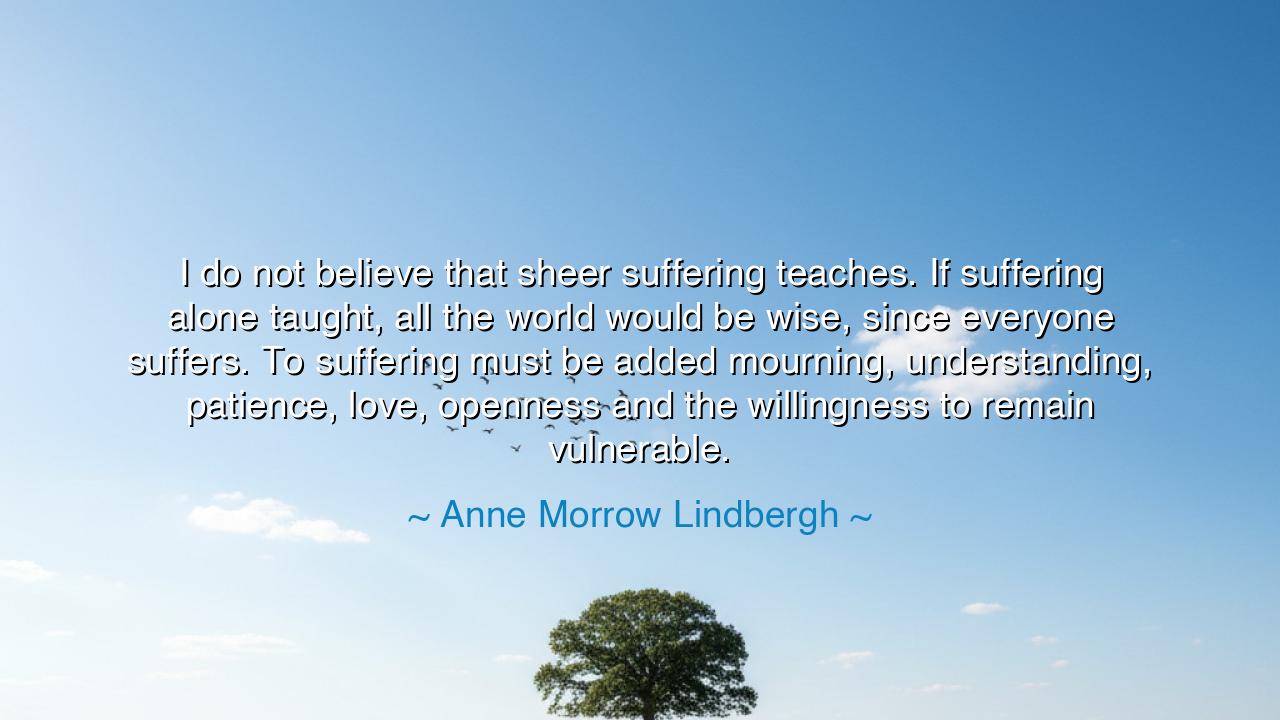
I do not believe that sheer suffering teaches. If suffering alone
I do not believe that sheer suffering teaches. If suffering alone taught, all the world would be wise, since everyone suffers. To suffering must be added mourning, understanding, patience, love, openness and the willingness to remain vulnerable.






In the profound words of Anne Morrow Lindbergh, she writes: “I do not believe that sheer suffering teaches. If suffering alone taught, all the world would be wise, since everyone suffers. To suffering must be added mourning, understanding, patience, love, openness and the willingness to remain vulnerable.” In these words lies one of the deepest truths of the human journey — that pain itself is not the teacher, but what we do with pain. Lindbergh, a woman who knew both the heights of glory and the depths of grief, speaks here from the crucible of experience. She teaches that suffering is not wisdom’s source, but its invitation. It is the door through which understanding may enter — but only if we open it with humility, tenderness, and courage.
When she declares that suffering alone does not teach, she rejects the cold comfort often given to the afflicted: that pain automatically makes us wiser, better, or more virtuous. The world, she reminds us, is filled with those who suffer yet learn nothing from their wounds — who become bitter instead of compassionate, hardened instead of strong. Pain, by itself, is merely the fire. It is mourning, the act of facing the pain, that turns agony into awareness. To mourn is to honor the truth of loss, to weep not only for what was taken but for what cannot return. In mourning, the heart softens, and from that softness, wisdom begins to grow.
Anne Morrow Lindbergh knew suffering well. The wife of aviator Charles Lindbergh, she endured the unspeakable tragedy of losing her young son, Charles Jr., in one of the most infamous crimes of the twentieth century. The world watched as the Lindberghs grieved, and many expected them to emerge as symbols of stoic strength. Yet Anne’s true strength was not found in denial, but in vulnerability. She allowed herself to mourn deeply and honestly, to face the darkness without fleeing it. It was through this mourning — not the suffering itself — that she began to find meaning again. In her later writings, especially in Gift from the Sea, she transformed her grief into wisdom, teaching others to embrace solitude, patience, and the quiet rhythms of renewal.
This is the essence of her teaching: that to truly learn from suffering, we must engage with it consciously. We must meet it with understanding, seeking not escape but insight. We must cultivate patience, for healing unfolds not in haste but in time. We must bring love — both for ourselves and for others — into the midst of our pain, allowing compassion to soften what bitterness would harden. And above all, we must remain open and vulnerable, even when our instinct is to close ourselves off. For the moment we shut our hearts to protect them, we also shut out the possibility of growth.
Consider the story of Nelson Mandela, who endured twenty-seven years of imprisonment under the weight of injustice. His suffering alone did not make him wise; it was his patience, reflection, and forgiveness that did. While many would have emerged consumed by hatred, Mandela chose understanding. He listened to his pain, learned from it, and let it become the soil of peace rather than vengeance. Like Lindbergh, he understood that wisdom is not born of agony, but of how the soul transforms agony into meaning.
From Lindbergh’s words, we learn that to suffer is human, but to grow from suffering is divine. Every wound offers a choice: to close in fear or to open in love. The first leads to despair; the second to rebirth. We cannot escape suffering — it is the thread woven through every mortal life — but we can decide what pattern we will make from it. When mourning becomes mindful, when pain meets patience, when vulnerability becomes the vessel of love, then suffering no longer destroys; it purifies.
Therefore, let this be the teaching: when sorrow visits you, do not ask merely, “Why must I suffer?” Ask instead, “What can I learn? Whom can I love through this pain? How can I keep my heart open?” For wisdom is not a gift of suffering, but a reward of openness. Practice tenderness toward your wounds; let them become teachers, not tyrants. In time, you will find that the same pain that once crushed you now humbles and enlarges your soul.
Thus, Anne Morrow Lindbergh’s words endure as a gentle but powerful truth: suffering is not the lesson — love is. Only when sorrow is met with understanding, patience, and vulnerability does it yield its hidden gift. To live wisely, we must not flee from pain, nor idolize it, but walk through it — mourning what was lost, yet keeping our hearts open to what might yet bloom from the ashes.






AAdministratorAdministrator
Welcome, honored guests. Please leave a comment, we will respond soon